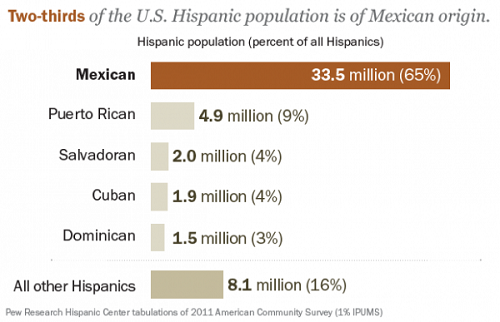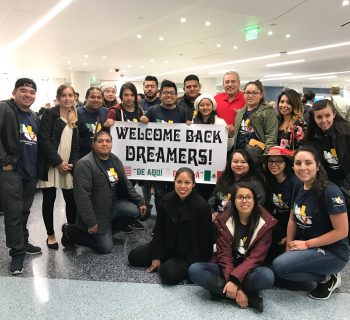By: Differencebetween.net ~ August 13, 2017
Have you ever wondered about the difference between Hispanic and Mexican? With all the different races, ethnicities and nationalities, it can be quite a task to learn them all and so often people use these terms interchangeably, referring to just one group of people who happen to have a Latin American descent – but this is wrong. When such terms are used incorrectly, the use of the terms might actually cause offense or insult to the people you are referring to.
The most basic difference between the two is the genre – Mexican is a nationality while Hispanic is an ethnonym. Before we move on to discussing the terms separately, let’s have a comparison between them:
The Definition
Mexican refers to an inhabitant or a native of Mexico which is a Latin American country.
Hispanic refers to a person who speaks Spanish, one of Latin American descent and resides in the USA.
The Language
In Mexico, Spanish is the main language but that doesn’t mean that all Mexicans can and do speak the language. Hispanics, on the other hand, all speak Spanish.
The Origins
When you trace the origins of Mexicans, you will find that most of them are able to trace their origins to Spaniards or indigenous people. Hispanics are a lot more diverse. They can trace their origins to Mexico, Cuba, Puerto Rico, Central and South America as well as other Spanish cultures.
The Country
A huge majority of Mexicans live in Mexico whereas Hispanics live in the USA.
As you can see, these two terms are definitely different from each other. There are open minded people out there who wouldn’t mind or care what term you use to refer to them however there are also people who are very proud and would easily be offended if they are referred to with the wrong term. So let’s take a closer look at these terms to be able to really understand and differentiate them.
What makes Hispanics different from Mexicans
The term Hispanic implies a link or relation to the country Spain or any other Spanish-speaking countries, especially those in Central and South America. On the other hand, Mexican actually refers to a person, object or even a concept from Mexico, which is a country found in Latin America.
When used as a noun, it refers to people who speak Spanish, especially those who have origins in Latin America and are living in the USA. So this means that Hispanic is actually an enthonym rather than a nationality. An ethnonym is a name or term given to a particular group of people and not a whole nationality or race.
The word “Hispanic” is actually derived from the Roman word Hispania, which was used to refer to the Iberian Peninsula. This is why some people have arguments that Hispanic can also be used to refer to any person with a link to any of the Spanish countries. However, especially these days, you must remember that this term is now more used to refer to those who live in the USA. In contrast to it, Mexican used as a noun, it refers to a citizen or inhabitant of the country, Mexico. Though a lot of people commonly believe that Mexican is a race of people, it’s not – it should be regarded as a nationality.
Origin of Hispanics and Mexicans
Since the government of the United States of America defines Hispanic as “people who can trace their descent or origin to Mexico, Cuba, Puerto Rico, Central and South America and other Spanish countries and cultures, this means that a Spanish person who actually lives in the USA can also be called Hispanic. When used or defined generally though, Hispanic actually refers to a Spanish-speaking person from a Latin American country who resides in the USA. It’s similar but not exactly the same.
On the other hand, the majority of Mexicans speak the Spanish language, but not all of them. Spanish was first introduced to Mexico after it was invaded by the Spaniards way back in 1521. However, there are some differences which have evolved or developed between the Spanish which is spoken in Spain and the Spanish which is spoken in Mexico.
Arguments can be made that the term should be applied to all the Spanish-speaking countries or cultures since the historical roots of the term specifically relate to the Iberian region. In reality, it’s quite difficult to label a whole nation or culture with just one term, such as “Hispanic.” This is because all the ethnicities, traditions, customs and forms of art are actually varied by each region and country. What are common are the Spanish culture and the Spanish language, which are the major traditions.
In the beginning, the term Hispanic had referred to the people of ancient Roman Hispania. These were people from the Iberian Peninsula, which included the present-day states of Spain, Andorra, and Portugal as well as the British Overseas Territory of Gibraltar.
With all this information and the whole evolution of the term, we can say that Hispanic refers to people of a Spanish Ancestry, which means that their family comes from Spanish roots and they can actually live anywhere in the world, not just in the USA.
Importance of Mexican or Hispanic
When we start talking about the different ethnic groups found in Mexico, you’d find out that there are different ones. The majority of the population of people in Mexico is made up of Indigenous people (meaning those from Yucatán, Quintana Roo, Campeche, Chiapas etc.), Mexicans who have European origins or descent and Mestizos (those who have combined origins of Indigenous and European ancestry). In comparison with Mexicans, the term Hispanic or Hispano/Hispánico in Spanish is actually a broad term which refers to the people, the nations and the cultures which have a strong historical link the Spain. It generally applies to countries which have once been owned by the Spanish Empire in the Americas and in Asia, specifically the countries of Latin America and the Philippines.
Mexicans, or Mexicano in Spanish, are the people who belong in the United Mexican States which is a multiethnic country which is found in North America. Mexicans can also be the people who identify with the Mexican national or Mexican cultural identity.
Nowadays, the modern nation of Mexico had gained its independence from the Spanish Empire. Their independence had begun the process of creating a national identity which combined the cultural traits of people with indigenous pre-Columbian origins with those of people with European (specifically Iberian) ancestry. This has then led to what is referred to as an unusual form of nationalism which is multi-ethnic.
As previously stated, the most spoken language in Mexico happens to be Spanish however other Mexicans may also speak different languages. There are about 68 different existing indigenous linguistic groups and a few other languages were brought and introduced to Mexico either by the most recent immigration or those learned by Mexican immigrant who lives in other nations.
So basically, the term Mexican or Mexicano can be used when referring to someone who was born in Mexico, someone who has a Mexican citizenship or someone of Mexican origins or descent. This means that not all Mexicans are Hispanic, but some of them can be referred to using that term. There are people from different countries living in Mexico and so their children who are born in the country are also called Mexicans.
Some Facts and Comparisons
You probably now have a better idea of how to use the two terms which are commonly misused in communication. As you’ve seen, there are differences between them that set them apart from each other and that is why you need to be careful in using these terms, especially when you are referring to people who carry their lineage proudly.
To help you out further and possibly reiterate and clarify things, here are some facts about both groups of people:
- A Mexican person can also be referred to as a Hispanic however not all Hispanics are Mexicans, so be very careful!
- The term Hispanic is actually a general term which is commonly applied to a huge group of people who have cultural or heritage ties with Spain or other territories which were conquered by Spain.
- Therefore this means that a Hispanic can be any individual living in the USA who is Mexican, Guatemalan, Puerto Rican, Cuban or such.
- A Mexican is a person from Mexico or a citizen of the USA who has both Mexican parents.
- Mexican doesn’t only refer to people, it also refers to anyone or anything related to Mexico such as food, culture, flag, etc.
- Hispanic then refers to anyone who has ties with Spain, the Spanish language or the Spanish culture.
- Sometimes, people who have roots with many of the Caribbean nations located to the south of the USA can be referred to as Hispanics.
Read more: The Difference between Hispanic and Mexican | Difference Between http://www.differencebetween.net/miscellaneous/culture-miscellaneous/the-difference-between-hispanic-and-mexican/#ixzz4pkY9I5ED







